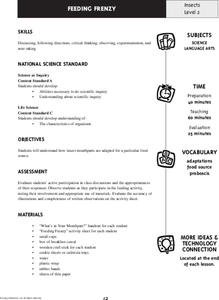Curated OER
Feeding Frenzy
Learners examine, through experimentation and simulation, how insect mouthparts are adapted for particular food sources, discuss how various animals have adapted to survive, play Feeding Frenzy game, and complete activity sheets.
Curated OER
The Life Cycle of the Butterfly
Second graders study the life cycle of a butterfly by observing metamorphosis taking place in a butterfly pavilion. Students illustrate their understandings of the body parts of a caterpillar and butterfly, as well as the life cycle,...
Curated OER
Chemical and Physical Changes
Middle schoolers experiment, identify and apply the concepts of chemical and physical changes utilizing real-world examples. They discuss and model physical and chemical changes, answer guided questions and play a game that reinforces...
Curated OER
Watch the Birdie
Students complete a six-week unit on North American birds. They conduct research, develop fact sheets, create labeled bird drawings, write a dictionary of bird vocabulary words, create a Concentration game, and observe birds in their...
Curated OER
Maintaining Strong Fisheries
Pupils play a game about the life cycle of a blue crab in order to witness the causes of changes in the crab population and discuss what a resource manager could do to keep a stable crab population. Students then create a game titled...
Curated OER
DON'T TREAD ON ME
Students explore how the habits and practices of people affect the soil and growth of plants. They are introduced to the phrase "soil compaction." Students play the Soil Particle Game in the related activities section. They go outside...
Curated OER
What If We Run Out?
Learners explore the consequences of shrinking habitats and the human impact on wildlife populations. They participate in a game to study the consequences and describe the preservation of animal habitats.
Curated OER
Radical Raptors
Students define raptor, explain why raptors are important, describe unique physical characteristics of various types of raptors, and explain life cycle of raptors. Students then play Habitat Game, describe food and hunting habits of...
Curated OER
Radical Raptors
Students study the lifestyles and habitats of raptors that live in Minnesota. They play games associated with their study.
Curated OER
Mussel Movements
Students consider the impact of invasive species on local environments. In this ecology lesson plan, watch the video, Arizona Wildlife Views, which focuses on invasive species. Students develop vocabulary, relate to meaningful...
Curated OER
Tree-Mendous!
Students classify trees. In this tree-mendous lesson, students categorize a variety of trees to assist them in playing a Jeopardy like game. Students identify new vocabulary terms and classify the uses and benefits of trees for humans.
Curated OER
Compost Tag
Students identify biodegradable items. For this environmental lesson, students participate in a game of tag. A student's name is called out along with a biodegradable item and the student is tossed a ball.
Curated OER
Habitat Awareness
Second graders build a habitat. In this wildlife lesson, 2nd graders work in groups to build a mammals habitat. They share their habitat with the class.
Curated OER
Healthy Heart
Students discover the power of their heart and provide an opportunity to talk about ways to maintain good health. In this early childhood heart lesson plan, students diagram a human heart, identify exercises that promote a healthy heart,...
Curated OER
Water Microbes and Human Health
High schoolers research the possible sources and human health effects of microbes found in recreational and drinking water. They explore the range of negative outcomes of contact with contaminated recreational and drinking water by...
Curated OER
Build a Polyp
Students research coral polyps. In this coral polyps instructional activity, students discover the anatomy of a coral polyp and how they feed. Students create an edible coral polyp model.
Curated OER
Understanding Interactions Among Local Species and the Local Environment
Students examine the differences between biotic and abiotic factors, explain the difference between habitat and niche and compare how organisms get their nutritional needs. In this local environment lesson students trace the path of...
Curated OER
Arbor Day
First graders study the importance of trees to our environment. they make their own version of the story by completing the following sentence and then completing an illustration for their writing. "A tree can be ______."
Curated OER
Winter Survival
Students examine what animals need in order to survive. In this investigative lesson students play a "role" of an animal in winter.
Curated OER
Plant Life for Kids
In these plant life worksheets, students complete a worksheet about parts of a plant, plant life, plant life cycle sequence, and then complete a plant life mini book.
Curated OER
Pollination
Fourth graders explore the pollination process. In this plant biology instructional activity, 4th graders dissect a flower to identify the parts of a flower and watch a video to see seed dispersal. Students write about the pollination...
Curated OER
Exploring Limu Diversity
Students explore limu diversity. In this ocean ecosystem lesson, students classify limu according to its physical properties. Students work in small groups to generate scientific observations and sort limu by characteristics.























